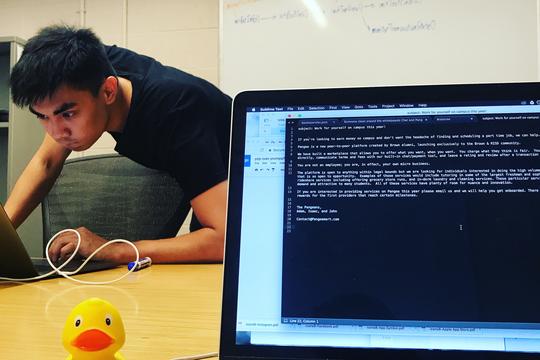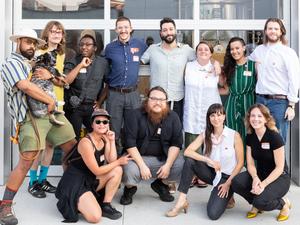
Pangea, if you recall, is the name for Earth’s singular supercontinent before ice ages and years of tectonic shifts separated said land mass into today’s seven. It’s a word synonymous with connection and unity, and for Adam Alpert, it was the best term to summarize the mission of his startup.
Pangea, or Pangeamart, has focused its efforts on developing an app that connects those with a “side hustle” (skills used to earn supplemental income) with others looking to benefit from those skills. It "provides the tools to list any services and goods you are willing to sell, build your legitimacy and credibility as a provider, and conduct peer-to-peer transactions," its website states.
Unsurprisingly, like many startups, Pangea was officially born in a dorm room; one at Brown University, to be specific. Alpert, who just graduated from Brown this year, was a sophomore at the time, and a friend (who would go on to become the app’s co-founder and chief creative officer), Isaac Zussman, pitched the idea that would become Pangea. His plan was inspired by years of travel, during which Zussman had more difficulty than he felt he ought getting odd jobs.
"Over 40 million Americans have a side job; we want to [engage them ALL] eventually.”
Alpert was sold on the idea, and after joining the team, recruited fellow Brown student John Tambunting. He taught himself to build the app, which he did “98 percent from scratch,” Alpert said.
The result allows users, or “Pangeans,” to download and register on the app for free. Pangeans can then access the main feed, where they can chose three separate toggles: goods, requests, or services, based on their needs, and search from there. Upon finding, say, a videographer service, the user in question can then expand the videographer’s profile and get a feel for their offerings and skills, chat with him or her, or negotiate the price. After booking the service, users pay in-app and are able to rate each other.
The team’s journey to a completed app (formally launched this past Friday) has been mostly self-funded, with few exceptions, Alpert told me. “We got a $500 grant from Brown, as part of Brown’s summer accelerators — the Breakthrough Lab,” he said. “Other than that, we are pre-seed, pre-revenue.” Alpert added that the team is participating in the B-Lab’s Pitch Night, where they would be hoping to court potential investors.
For now, “we make money when our providers make money,” Alpert explained. “We take 10 percent and our payment [platform] takes 2.39 percent; we show the user what the end payout will be.” Eventually, “we want to drop the commission; we’d love to become a totally free marketplace someday."
Currently, only those with a .edu email address, specifically from Brown, Rhode Island School of Design, and Johnson and Wales University, can register on the site. While Pangea certainly has plans to expand, Alpert told me that slow-and-steady is the current guiding mindset. “It’s very difficult to start a marketplace and spit it out to every place,” he said. "Over 40 million Americans have a side job; we want to [engage them all] eventually.” For now, keeping the audience local and college-age is ideal. Students are, after all, “highly connected, underemployed, [and] densely populated,” he added.
The next three months will be about drumming up excitement amongst that college-focused, initial market. “Getting people paid would be a success,” Alpert said.
He added that Pangea was fundamentally more than a transactional service. “I want to … facilitate face-to-face connection,” he said. “[It's] about connecting and unifying people."










